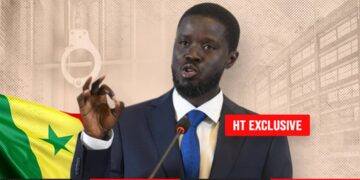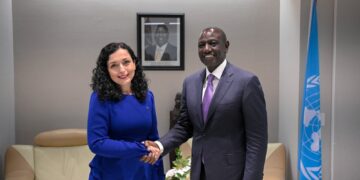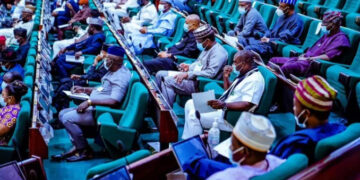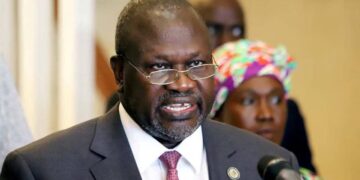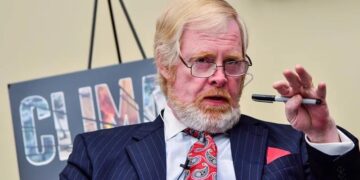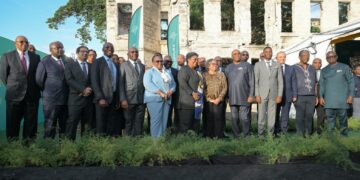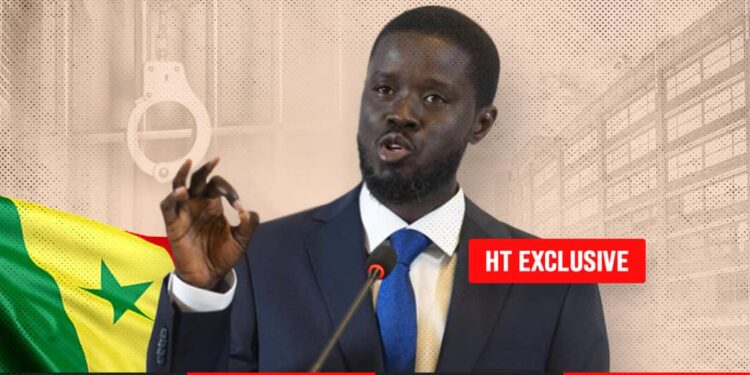By Enyichukwu Enemanna
Senegal last week made history by electing a 44-year-old political newcomer as the youngest President, just about ten days after he was released from politically-motivated incarceration under the outgoing President Macky Sall. Like the biblical Joseph who from Egyptian prison rose to stardom by his ability to interpret dreams, Bassirou Faye from the darkness of his small detention facility where he showered, exercised, prayed, and rose to the helm of one of the fastest growing economies in West Africa.
The Heritage Times (HT) recalls that Faye’s ever won election was the one that made him the president-elect of Senegal. Before now, he had only ran for mayor of his hometown, Ndiaganiao a small settlement on a sandy track, crisscrossed by horse carts carrying women and their wares to the market. He lost that election in 2022, to the ruling party’s candidate.
Prior to his elevation, Faye had since last year April been locked up in jail where he spent over 11 months, arising from a Facebook post which authorities deemed defamatory and critical of the justice system. An ally of Ousmane Sonko, leader of opposition Patriotes africains du Sénégal pour le travail, l’éthique et la fraternité (Patriots of Senegal for Work, Ethics, and Fraternity, or PASTEF), Faye was charged with contempt of court, defamation and acts likely to compromise public peace.
READ ALSO: Mozambique To Host Africa’s Industry Experts At 10th Mining & Energy Conference
Unlike his mentor Sonko who was disqualified from contesting because of a suspended jail sentence following a conviction for defamation, Faye was not convicted of any crime and was able to stand in the election. He also secured the endorsement of Sonko who had urged Faye to run on his behalf. Sonko was disqualified along with Karim Wade, son of former President Abdoulaye Wade.
Sonko and Faye studied law and worked as tax inspectors, where they met and spoke out against corruption, and later co-founded the now-dissolved PASTEF party in 2014.
At the end of the poll last Sunday, March 24, Faye secured 54 percent of votes cast in the delayed presidential poll, leaving his closest rival, Amadou Ba of the governing coalition who was handpicked by outgoing President Macky Sall, with just about 35 percent of the votes.
With this, Faye now stands as the youngest elected President in Africa, having been confirmed by the Senegalese Constitutional Council as president-elect, paving way for his inauguration as the fifth President of the West African country on Tuesday, April 2 when the tenure of President Macky Sall officially comes to an end.
Analysts believe the victory by opposition over the governing coalition is a reflection of protest against the outgoing leadership. Macky Sall had delayed the poll earlier scheduled to hold February 25, a development viewed as violation of the constitution and an attempt to extend his tenure into a third term.
The country has also grappled with political crisis in the last three years, raising questions on the future of civil rule in a nation often considered as the oasis of democracy in West Africa, having not experienced military incursion despite a sweeping coup in neighbouring nations.
The turbulence came to a head last year in July when violent protests erupted following the arrest of Sonko who was very popular among the youth population, a week after he had been convicted for what was termed immoral behaviour and sentenced to two years. In response to the protests, authorities deployed large number of security agents who dispersed the demonstrators with tear gas. It also disconnected Internet access, in addition to mass arrest of opposition protesters.
Senegalese youths were also frustrated over the growing unemployment rate which left them with the option of joining the anti-government protest with the hope that a new government could meet their yearnings.
Liberia, Senegal and the Age Question
One thing that comes to front burner in recent times, talking about leadership recruitment has often been age factor. There is clamour for young people to be at the centre in leadership process both in business, economic and political cycle. This is not unconnected with the fast-changing dynamics of governance where leaders are constantly on the quest for more innovative means of providing solutions to nagging questions and young people are seen from the eye of millennial as having the ability to infuse creativity, vibrancy and currency into governance to navigate through seemingly complex situations.
Countries across the world are fast opting for young men and women at the helm of affairs. In January, a 34-year-old Gabriel Attal became France’s youngest-ever prime minister. Many other countries across the world have leaders in their 30s and early 40s. In Chile, Gabriel Boric, 37 holds sway as the country’s President. At 35, he won Chile’s presidential election. Upon his inauguration, he announced to a roaring crowd, “I guarantee that I will be a president who cares for Democracy … and attends to the needs of the people daily.”
Now 44, Leo Varadkar became Ireland’s prime minister at age 38. Before becoming Ireland’s youngest and first openly gay, Varadkar served as Minister for Transport, Tourism and Sport; Minister for Health; and Minister for Social Protection.
Xavier Espot Zamora, 44, is the prime minister of Andorra. In May 2019, the politician and lawyer was appointed prime minister of Andorra, a tiny, independent principality in the Pyrenees mountains between France and Spain. Andorra is the sixth-smallest European nation and has a population of approximately 77,000. Before taking the top spot, Zamora was the Minister of Social Affairs, Justice and Interior.
There are several similar instances, which Senegal also followed by choosing the 44-year-old former tax administrator over the government-backed Amadou Ba, 62.
This comes months after the neighbouring Liberia voted out the 57-year-old former professional footballer, George Weah who served just one term as country’s 25th President. Arising from controversies that trailed his administration, including financial misappropriation, Weah was stopped at the polls from getting a second term in office, having dashed the hopes that ab-initio brought him to power.
Voters demystified whatever his age stood for and went for the former Vice President of the country, 79-year-old Joseph Boakai, popularly referred to as sleeping Joe who is nearly two times older than his Senegalese counterpart, Faye.
Upon assumption of office, Boakai vowed to end corruption. “A lot of people come into government believing they are there to enrich themselves,” Boakai told BBC in a recent interview. “They don’t understand what public service is about.” Boakai says he has been “very selective” about who he brings along with him because he blames corruption “for all the crises we’ve had.”
Good Ambassador of African Youths
In his reaction to Faye’s victory, a former Deputy National Publicity Secretary of the Nigeria’s governing All Progressives Congress (APC), Comrade Timi Frank in a statement made available to The Heritage Times (HT) urged him to demonstrate rich ideas, innovativeness and transformative energy of youths in Africa and beyond and not to disappoint the people of Senegal.
Frank said: “We urge you to put the interests of the youths of Senegal first before any other consideration. Work hard to show that the youths can also be relied on in the continent.
“Make sure you keep to your campaign promises and be a good ambassador of not just the youths of Senegal but the entire continent. Besides, Don’t betray opposition leader, Ousmane Sonko, since you are now the ultimate beneficiary of his struggles, political persecution and imprisonment.
“Never forget that the sacrifices he made contributed immensely in your emergence as Senegal’s incoming President. Above all, work with all positive and progressive forces in Senegal to build the country.”
Frank also enjoined the Senegalese incoming President, upon assumption of office, he immediately release all political detainees incarcerated by Mr. Sall and ensure that all those that died during the struggle to defend the country’s constitution and democracy are accorded special honour by remembering their families.
I’ll Govern With Humility and Transparency — Faye
While delivering his speech, Faye thanked his opponents for respecting Senegal’s democratic tradition by recognizing his victory well before the announcing of official results.
“In electing me, the Senegalese people have decided on a break with a past,” Faye told journalists in his first public appearance since the election, adding, “I promise to govern with humility and transparency.”
Faye said he will dedicate more state resources to help the nation’s youth. The president-elect has also promised left-wing Pan-Africanism and to renegotiate gas and oil contracts, with Senegal due to start production on recently discovered oil and gas reserves later this year. Still, he sought to reassure investors that the country would respect its commitments.
Ba, the candidate for the ruling coalition said he wishes Faye success “as the head of our country.”
“The Senegalese people have reinforced the good health of our democracy,” he said.
The United States echoed the sentiments passed by Sall and his hand-picked candidate, Ba. “The commitment of the Senegalese people to the democratic process is part of the foundation of our deep friendship and strong bilateral ties,” Matthew Miller, the State Department spokesperson said while speaking to reporters.
